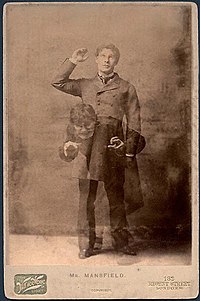Alter ego
This article needs additional citations for verification. (June 2010) |
An alter ego (Latin for "other self") is a second self, which is believed to be distinct from a person's normal or true original personality. A person who has an alter ego is said to lead a double life. The term appeared in common usage in the early 19th century when dissociative identity disorder was first described by psychologists.[1] Cicero coined the term as part of his philosophical construct in 1st-century Rome, but he described it as "a second self, a trusted friend".[2]
A distinct meaning of alter ego is found in literary analysis used when referring to fictional literature and other narrative forms, describing a key character in a story who is perceived to be intentionally representative of the work's author (or creator), by virtue of oblique similarities, in terms of psychology, behavior, speech, or thoughts, often used to convey the author's own thoughts. The term is also sometimes, but less frequently, used to designate a hypothetical "twin" or "best friend" to a character in a story. Similarly, the term alter ego may be applied to the role or persona taken on by an actor[3] or by other types of performers.
The existence of "another self" was first recognized in the 1730s. Anton Mesmer used hypnosis to separate the alter ego. These experiments showed a behavior pattern that was distinct from the personality of the individual when he was in the waking state compared with when he was under hypnosis. Another character had developed in the altered state of consciousness but in the same body.[4]
Alter ego is also used to refer to the different behaviors any person may display in certain situations. Related concepts include avatar, doppelgänger, impersonator, and dissociative identity disorder (DID).
In fiction

- The title characters in Robert Louis Stevenson's thriller Strange Case of Dr Jekyll and Mr Hyde represent an exploration of the concept that good and evil exist within one person, constantly at war.[5] Edward Hyde literally represents the doctor's other self, a psychopath who is unrestrained by the conventions of civilized society, and who shares a body with the doctor. The names "Jekyll and Hyde" have since become synonymous with a split personality or an alter ego that becomes capable of overpowering the original self.
- Norman Douglas in the late 1890s wrote a short story, "The Familiar Spirit", about a man who became aware while drowning of a conformist second self – "the presence within him of this Spirit, his alter ego, which is bent on crushing his ambition".[6]
- In comic books, superheroes and their secret identities are often considered alter egos. The archetypal comic book hero, Superman, assumes the identity of the "mild-mannered" newspaper reporter Clark Kent in order to live among the citizens of Metropolis without arousing suspicion. The Incredible Hulk comic book series further complicates this theme, as Bruce Banner loses control to the Hyde-like Hulk whenever he becomes angry, yet also depends upon the Hulk's super powers in order to combat villains. Comic book-inspired alter egos can be seen in other forms of popular fiction, including television and movie adaptations of comic books, parodies of this genre, and unrelated fictions.[citation needed]
- The movie Fight Club, the narrator, played by Edward Norton, has an alter ego he loses control of, Tyler Durden, played by Brad Pitt.
- The Malayalam movie Ustaad written by Ranjith and directed by Sibi Malayil and starring Mohanlal has a theme of alter ego.
- Sonic the Hedgehog and Shadow the Hedgehog are considered as alter ego look-a-likes of each other.
- Crash Bandicoot has an alter ego clone called Fake Crash Bandicoot.
- In Disney's Hannah Montana, Miley Stewart, played by Miley Cyrus, leads the life of high school student, and the life of teen pop sensation Hannah Montana. Likewise, Miley's friends, Lilly Truscott, played by Emily Osment, and Oliver Oken, played by Mitchell Musso, also lead the lives of high school students, and are what makes up Hannah's entourage, Lola Luftnagle and Mike Stanley III respectively.
- In American Dad, Roger the Alien assumes various alter egos in order to go out in public without letting anyone finding out that he is a space alien.
- In Calvin and Hobbes, Calvin has multiple alter-egos: Spaceman Spiff, Stupendous Man, Tracer Bullet, and various other unnamed egos in Calvin's fantasies.
- The popular YouTube personality, Miranda Sings, is the alter-ego of Colleen Ballinger.
- In Seinfeld, the character of George Costanza was revealed to be an alter-ego to the show creator Larry David.
- In the 2013 film The Double by Richard Ayoade, the character of James is considered to be the alter-ego of Simon, which both characters are played by Jesse Eisenberg.
See also
- Ustaad
- Ego-state therapy
- Moniker (nickname)
- Mononymous person
- Pen name
- Persona
- Pseudonym
- Ring name
- Stage name
- Subpersonality
- True self and false self
- Sasha Fierce
- Chris Gaines
- Mr. Bad Guy
- Slim Shady
- Ziggy Stardust
- Dissociative identity disorder - a mental disorder in which sufferers change personality and identity.
References
- ^ Irving B. Weiner, Donald K. Freedheim (2003). Handbook of Psychology. John Wiley and Sons. p. 262. ISBN 0-471-17669-9.
- ^ "Alter Ego". Collins English Dictionary - Complete and Unabridged 10th Edition. William Collins Sons & Co. Ltd. 2009. Retrieved 13 January 2013.
- ^ Glenn Daniel Wilson (1991). Psychology and Performing Arts. Taylor & Francis. ISBN 90-265-1119-1.
- ^ Pedersen, David (1994). Cameral Analysis: A Method of Treating the Psychoneuroses Using Hypnosis. London, U.K.: Routledge. p. 20. ISBN 0-415-10424-6.
- ^ I. Ousby ed., The Cambridge Guide to Literature in English (Cambridge 1995) p. 263
- ^ N. Douglas, Looking Back (London 1934) p. 274
